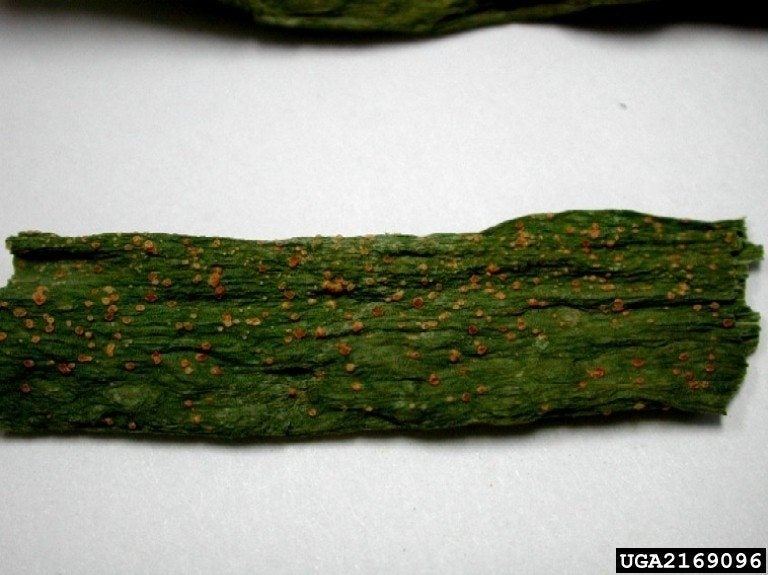Onion Plant Rust Treatment: Will Rust Disease Kill Onions


What is Puccinia allii? It's a fungal disease of plants in the Allium family, which include leeks, garlic, and onions, among others. The disease initially infects the foliar tissue and can result in stunted bulb formation if the plants are heavily infested. Also known as garlic rust disease, preventing puccinia allii rust can enhance your Allium crop.
Will Rust Disease Kill Onions?
First, the gardener must know what is puccinia allii and how to recognize it. The fungus overwinters in plant material and is most destructive in regions with heavy rain and fog. Over irrigating can also promote the formation of the spores that cause the fungal disease. The fungus appears as white to yellowish spots on the foliage and enlarge as the disease progresses. The spots become orange and they develop into black lesions over time. So will rust disease kill onions and other alliums? In some field crops the fungus has caused dramatic losses and reduced yields. For the most part, garlic rust disease reduces plant vigor and size of bulbs. The disease is contagious and passes from plant to plant, as the spores are splashed onto neighboring foliage or are air borne through the crop.
Preventing Puccinia Allii Rust
There is a saying, “prevention is half the cure,” which is apt for most crop disease situations. Once the crop has garlic rust disease, you need to resort to chemicals for a cure. It's much easier and less toxic to prevent the formation of the spores in the first place. Since the fungus overwinters on other plant material, clean up dead plants at the end of the season. Rotate your allium crops to areas that were not previously hosting plants in the family. Remove wild forms of allium, which can also host the fungal spores. Don't water overhead and water in the morning. This gives foliage time to dry off quickly before the excess moisture can force a bloom of the fungal spores. There are no resistant varieties of Allium species.
Allium Rust Treatment
Once you have the disease on your plants, there are several chemical treatments that can combat the fungus. Fungicides must be labeled for use on edible plants and specify usefulness against puccinia allii rust. Always follow the directions and use with proper safety precautions. Fungicides should not be used within seven days of harvest. The best time to treat is before you see the spores. This may seem silly but effectiveness of fungicides is reduced when the plant is obviously infected and spores are in full bloom. If you've had problems with orange onion leaves or spotted foliage, then you can be sure you have the disease in your garden. Every season apply a preventative fungicide to the crop leaves.
Cultural Control of Garlic Rust Disease
Plants that are not stressed seem to tolerate small infestations of the fungus. Apply bulb fertilizer in early spring and keep the plants moderately moist. Plants with heavy layers of mulch may contract the disease from the soggy organic material. Pull away the mulch from just around the forming bulbs as the season progresses.
Sign up for the Gardening Know How newsletter today and receive a free copy of our e-book "How to Grow Delicious Tomatoes".

Bonnie Grant is a professional landscaper with a Certification in Urban Gardening. She has been gardening and writing for 15 years. A former professional chef, she has a passion for edible landscaping.